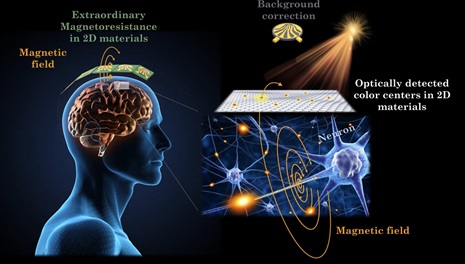
Measuring the tiny magnetic fields produced by neuronal currents allows us to non-invasively understand how the brain functions. Today, this is done with superconducting sensors that must operate at cryogenic temperatures. This greatly increases the cost and complexity of such systems, and reduces their flexibility and spatial resolution. The aim of BIO-MAG is to create small, biocompatible and lightweight magnetic sensors with femtotesla sensitivity, suitable for mapping neuronal activity in living organisms at room temperature using radically new smart materials.
We will do this by developing two innovative and complementary types of magnetosensitive systems, which together will provide the needed range of sensitivity and spatial resolution. One sensor will be based on the extraordinary magnetoresistance effect - providing femtotesla field sensitivity with a spatial resolution down to 10 μm. The other sensor will provide picotesla sensitivity below 1μm using magnetically sensitive color centers in 2D materials. The performance of both sensor types will be enabled by 2D materials with tailored functionality, provided by controlling lattice defects at the atomic level.
To push the limits of detection, we will combine arrays of these sensing elements to produce real-time maps of neurons in action with pico- to femtotesla magnetic field sensitivity, macroto nanoscale spatial resolution and millisecond temporal resolution, all performed simultaneously in a single device at room temperature. This can pave the way for non-invasive movies of individual neurons in action in networks recorded at up to 10,000 fps, which will greatly extend our understanding of how the brain processes information. Bridging the gap between fundamental biomagnetic neuroresearch and pre-clinical magnetoencephalography will lead to faster development of treatments for brain diseases and provide a groundbreaking research tool for solving major unsolved questions in neuroscience and medicine.
This project has received fundings from NNF - Challenge Programme 2021 - Smart Nanomaterials for Applications in Life-Scienceand will be running from 01-01-2022 to 31-12-2027